Did you know many Linux and UNIX systems come with Python pre-installed? Even some Windows computers, like HP models, have Python ready to go. Python is great for both newbies and seasoned programmers. It’s simple to grasp and use, thanks to the Python website’s vast resources.
The website has a quick tutorial, a library guide, and a language reference. The Python Tutorials Package Index, or the Cheese Shop, is where you find apps and libraries. For more help, Google searches and the Python newsgroup are excellent resources.
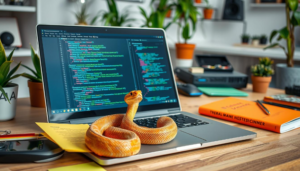
Key Takeaways
- Python is a widely used programming language suitable for beginners and experienced programmers.
- Many Linux and UNIX distributions include a recent Python version for easy installation.
- The Python website provides comprehensive resources, including a brief tutorial and language reference.
- The Python Package Index, also known as the Cheese Shop, is a platform for finding applications and libraries.
- Google searches and the Python newsgroup can be helpful for Python-related queries.
Getting Started with Python Programming Essentials
Python is a super preference for beginners to analyze programming. It’s famous and versatile, with a developing person base. In 2020, 66.7% of humans wanted to maintain the usage of Python. It’s now the 0.33 most famous language, after C and Java.
To start with Python, follow a few key steps.
Understanding Python Installation Requirements
First, make sure you have Python on your computer. Installing it is easy, with help on the BeginnersGuide/Download wiki page. Remember, Python 3 is the current version, as Python 2 is outdated.
Choosing the Right IDE and Text Editors
After installing Python, pick an IDE or text editor. Choose ones made for Python programming for better features. PyCharm, Visual Studio Code, and Sublime Text are good options.
Python Tutorials: Basic Setup for Beginners
With Python and your chosen editor, start learning the basics of Python. The Beginners Guide/Python Tutorials page has guides for all levels. It also has resources for those who don’t speak English well.
Key concepts to learn include Boolean types, strings, and math operations. Also, lists, loops, dictionaries, functions, and error checking are important. Jupyter notebooks are great for writing and running code online.
By following these steps, beginners can get started with Python. Python is a powerful language with lots of resources. It’s a great place to start your programming journey.

Python Tutorials: From Basic Syntax to Advanced Concepts
Learning Python’s basics is fundamental for brand-new programmers. Courses like “Introduction to Python Programming Course,” “Learn Python the Hard Way,” and “The Python Tutorial” are remarkable for beginners. But do not spend too much time on just the fundamentals. The practical use is where the actual getting to know takes place.
Python is more than just simple code. It has many statistical sorts, control systems, and capabilities. These fundamentals are the inspiration for more complicated subjects like decorators and turbines.
Python is outstanding for plenty of obligations, like internet improvement and information technology. Big names like Google and Amazon use Python. Python is likewise very popular, with high demand and desirable salaries for professionals.
Python has something for everybody, from beginners to experienced coders. Its tutorials and resources are full of knowledge. Learning Python training courses, learning to code Python, and the Google Python course are both rewarding and fascinating.
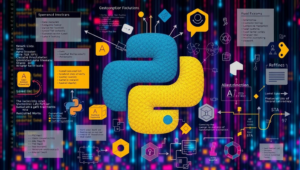
Essential Python Libraries and Tools for Development
Python is a versatile programming language with a vast ecosystem of libraries and tools. These resources are great for web development, data analysis, machine learning, and automation. They can make your Python programming experience better.
Popular Python Frameworks
Django and Flask are two top Python frameworks for web development. Django has many capabilities, like an object-relational mapper (ORM) and an integrated admin interface. Flask, on the other hand, is lightweight and flexible, making web app development easy.
Package Management with Pip
Pip is Python’s standard package manager. It makes installing and managing libraries and tools easy. With Pip, you can search, install, upgrade, and remove packages, keeping your environment up-to-date and organized.
Development Environment Setup
Setting up excellent development surroundings is prime for efficient Python programming. You’ll want to pick out an Integrated Development Environment (IDE) or textual content editor like PyCharm, Visual Studio Code, or Sublime Text. Also, putting in place virtual environments and using version management systems like Git is crucial for coping with your code and running with others.
| Popular Python Libraries | Description |
| NumPy | Supports large, multi-dimensional arrays and matrices, along with high-level mathematical functions. |
| Pandas | Offers data structures and tools for data analysis, making it easy to work with structured and time-series data. |
| Matplotlib | Creates static, animated, and interactive visualizations, including plots, charts, and graphs. |
| SciPy | Provides numerical and scientific computing, including optimization, linear algebra, and more. |
| TensorFlow | A powerful library for machine learning and deep learning, used for tensor operations. |
| Scikit-learn | Features various algorithms for classification, regression, and clustering, including support vector machines and random forests. |
| PyTorch | Provides strong GPU acceleration for tensor computations and neural network operations. |
| PyGame | A set of Python modules for writing video games, offering low-level access to audio, keyboard, mouse, and graphics hardware via OpenGL. |
| PyBrain | A modular machine learning library for Python, designed to be flexible, easy to use, and fast. |
These are just a few examples of the many Python libraries and tools available. Whether you’re building a web app, analyzing data, or working on machine learning projects, the Python ecosystem has something for you. Exploring and mastering these resources can greatly enhance your Python tutorials online and Python full course experience.
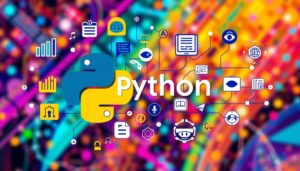
Building Your First Python Projects
Starting with learning Python programming is best done through hands-on projects. Beginners can find structured projects on Dataquest, which offers interactive data science lessons. You can also try analyzing datasets, building machine learning algorithms, or creating mobile apps with Kivy.
Developing web applications with Bottle or Django, making games with Pygame, or working on hardware projects with Arduino or Raspberry Pi are also great ideas. It’s key to pick projects that interest you to stay motivated.
A 2020 survey by Stack Overflow found that developers want to learn Python the most. Almost half of all developers use Python, making it a crucial skill for new programmers. Python is often used for web scraping, which is useful for data analytics and fintech projects.
Python modules, like the random-number module, make coding easier for basic projects. Mad Libs and Hangman are great for beginners learning Python tutorials. You can also create apps like a contacts list or games like Tic-Tac-Toe, which are more challenging.
There are over 60 fun and rewarding Python tutorials projects for learners at all levels. These include free guided projects with an embedded code editor in the browser. Projects range from building an interactive game to analyzing app market data and more.
Data science projects include analyzing NYC high school data and predicting weather using machine learning. AI enthusiasts can build AI chatbots or a food ordering app. Game development projects go from simple Rock, Paper, Scissors to complex Snake games.
Web development projects include creating URL shorteners and building web pages with Django. You can also make Twitter bots, address books, or cryptocurrency apps. Beginner projects include text encryption generators, countdown calculators, and sorting methods.
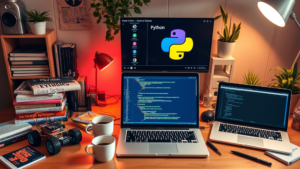
Practical Applications and Real-World Python Programming
Python is loved for its wide use in many areas. It’s a top pick for web development, thanks to Django, Flask, and Bottle. These tools help build fast, growing websites and apps.
In data science and machine learning, Python stands out. It has Scikit-learn, NumPy, and Pandas for deep data work. Its easy-to-use nature and vast library make it a favorite for many.
Automation and Scripting
Python is also great for automating tasks. “Automate the Boring Stuff with Python” shows how to make tasks easier. This lets developers work on bigger projects.
Python is used in many cool projects, like mobile games and smart homes. As developers get better, they can handle harder tasks. They can even help improve Python itself.
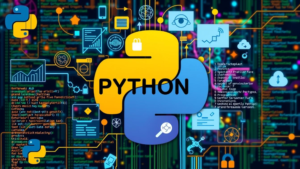
“Python is the main coding language for more than 80% of developers, according to a survey mentioned in the text.”
Python is used in many fields, from finance to space. It’s seen as a strong, sought-after language. Python offers chances to learn and apply skills in real-world projects.
Conclusion
Learning Python tutorials is a journey that never ends. It needs dedication, practice, and a desire to learn more. Starting with the basics and then moving to harder topics is a good way to get better at Python.
Using online resources, joining Python groups, and working on open-source projects can help you learn faster. These steps give you hands-on experience and make you a better programmer. Being able to solve problems and keep learning is key to being good at Python.
Python is great for many things like web development, data science, machine learning, and automation. With hard work and the right attitude, you can become skilled in the best way to learn Python. This skill can help you solve many real-world problems.
FAQ
What is Python, and why is it a good language for beginners?
Python is a versatile programming language. It’s great for both newbies and seasoned programmers. It’s easy to learn and use, with many Linux and UNIX systems having it. Some Windows computers, like HP’s, even come with it pre-installed.
Where can I find resources to learn Python?
The Python website has a lot of resources. You can find a brief tutorial, library reference, and language reference there. The Python Package Index (Cheese Shop) helps you find applications and libraries. Google searches and the Python newsgroup are also good for questions.
How do I install Python?
Installing Python is easy. You can find instructions on the BeginnersGuide/Download wiki page. It’s best to use IDEs and text editors made for Python.
What are the basic Python concepts I should learn?
You should learn about boolean types, strings, and math operations. Also, lists, loops, dictionaries, functions, and error checking are key. Jupyter notebooks are great for Python programming.
What resources can help me learn Python syntax efficiently?
“Introduction to Python Programming Course,” “Learn Python the Hard Way,” and “The Python Tutorial” are good resources. Spend no more than a month on syntax before starting projects.
What are the essential Python fundamentals I should learn?
You need to know about data types, control structures, functions, and object-oriented programming. Advanced topics include decorators, generators, and context managers.
What Python libraries and tools are commonly used?
Python has many libraries and tools for different tasks. Django and Flask are popular for web development. NumPy and Pandas are great for data analysis. TensorFlow and PyTorch are used for machine learning. Pip is the package manager for installing libraries.
How can I set up a proper Python development environment?
A good development environment is key. Choose an IDE or text editor, set up virtual environments, and learn Git for version control.
What are some good Python project ideas for beginners?
Start with structured projects from Dataquest for interactive data science lessons. You can also analyze datasets, build machine learning algorithms, or create mobile apps with Kivy. Web applications with Bottle or Django, games with Pygame, or hardware projects with Arduino or Raspberry Pi are also good ideas.
What are some real-world applications of Python?
Python is used in many areas. In web development, Django and Flask are favorites. For data science and machine learning, Scikit-learn, NumPy, and Pandas are essential. Python is also great for automation and scripting, with “Automate the Boring Stuff with Python” offering practical advice.

